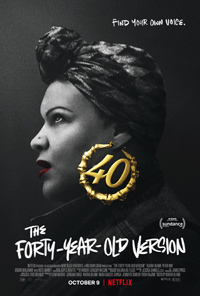What Happens to a Dream Deferred?: Blank Finds the Beauty of Herself in Striking Debut
 Writer/director Radha Blank arrives in the wake of an opulent blaze with her debut both in front of and behind the camera with The Forty-Year-Old Version, a film which feels like a well-tailored outfit replete with just the right accoutrements to feel like an original take on a classic formula.
Writer/director Radha Blank arrives in the wake of an opulent blaze with her debut both in front of and behind the camera with The Forty-Year-Old Version, a film which feels like a well-tailored outfit replete with just the right accoutrements to feel like an original take on a classic formula.
Offering the portrait of an artist as a struggling Black woman writer, it is a personal statement on finding your own voice while stressing the necessity of creating your own opportunities. The consequences of doing so reflect a meaningful struggle in maintaining creative integrity through rejecting a system of white patriarchal hierarchy only designed to marginalize and control representations which ultimately threaten the status quo. Eloquent, poignant, and funny, it’s a multilayered love story of the self, which ultimately seizes the reality of paving the way to accept and foster the chances one deserves. At its center is a formidable talent in Blank, whose wit in both writing, music and performance marks her directorial debut as a dream long deferred, perhaps, but blooms despite the weight of its heavy load to gracefully explode.
On the even of turning forty, Radha (Blank) finds herself once more on the precipice of breaking through as a NY playwright. Having won a prominent award a decade earlier, her career has since stalled, now teaching an acting workshop to a clutch of Harlem students who seem more interested in her than the craft itself. When her friend and agent Archie (Peter Kim) goes to great lengths to secure a conversation with a prominent producer J. Whitman (Reed Birney), it seems her play Harlem Ave. might have a chance of being staged—until the producer suggests she rewrite her labor of love with a white lead to better present the problems of gentrification since her play feels like it wasn’t written by a Black person anyway (and will eventually be a product of consumption for white liberal elitists anyway). While the meeting ends disastrously, an anguished Radha stumbles onto the notion of creating her own mixtape under the newly coined named RadhaMUSPrime, consulting with the younger D (Oswin Benjamin) to supply her with beats. Through these new connections, she begins to reroute her professional and personal desires.
Initially, The Forty-Year-Old Version might seem like an odyssey we’ve seen before, a struggling NY playwright so lost in the desperation to mount her work she allows it to be taken out of her hands and mercilessly perverted by the powers that be (it’s core is not terribly far from the much more broadly comedic satire Bullets Over Broadway, 1994, from Woody Allen).
Shot in striking black and white by Eric Branco (Clemency, 2019), it’s grainy black-and-white glare assists in transporting us into certain East-coast vibe of the gray drudgery of creation stymied by circumstance, but Radha’s energy melds into this in a way suggesting the meeting of minds like Issa Rae and John Cassavetes. Very deliberately, it bleeds into a stunning character portrait of a Black woman who is still mourning the loss of her artist mother and struggling to face the reality of her favored profession’s rejection of her.
An early scene which established her friendship with Peter Kim’s Archie, another breath of fresh air in these landscapes, should be maudlin satire but remains uncomfortably cutting through snippets of liberal white connoisseurs freely butchering seminal classics to transpose their own perspectives. A multi-racial Fences! An all-woman 12 Angry Men! A Harriet Tubman and/or Shirley Chisholm musical! Before Blank even begins her fraught conversation with white, gay theater producer Reed Birney’s (pitch-perfect) J. Whitman, we know her Harlem Ave is doomed, at least as she desires it to be. Slowly, all the excitement associated with her project coming to life slowly evaporates as she’s forced to make concessions, beginning with injecting a white female lead, then changing the dialects of her Black female lead to speak in vernacular, and, what seems the incontrovertible blow, an inability to score a Black director, settling for the well-meaning but woefully tone deaf Julie Lipshitz (Welker White). Featuring a cast of newcomers (including a memorable Oswin Benjamin), Blank also inserts some rap talents both playing themselves (in a Queen of the Ring aside which nails an energy often exaggerated in these infrequently filmed performances, like RZA’s Love Beats Rhymes, 2017) she also inserts a surprising cameo from Young Ma.
What represents a saving grace for both Blank and her audience is the passion with which she explores making her mixtape, a passing whim which seems a coping mechanism/distraction, her age the deciding factor which places her in another realm in which her voice isn’t entirely welcomed. But where are these avenues for Black women (“Even my dreams need rewrites,” she quips)? Where are their unique perspectives to be welcomed, fostered, developed, and respected? As The Forty-Year-Old Version asserts, it’s a road one has to pave for oneself, especially when one’s perspective is peripheral to a homogenous majority. Filled with moments both authentic and painful, both theatrically satirical and musically impressive, The Forty-Year-Old Version rejects the old, tried and true way of white validation.
★★★★/☆☆☆☆☆


